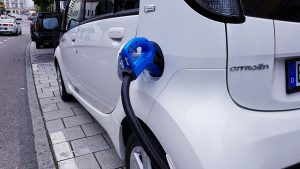At the time of writing, electric vehicles (EVs) that are part of a salary sacrifice package (novated lease) are exempt from fringe benefit taxes in Australia. This might be enough for you to pick one if your boss has decided to offer you this sort of deal.
However, before you sign on the dotted line and head on down to the dealers to do some hands-on research and get the lease all set up (and we can help you with that), it’s probably good to pause and have a look at the pros and cons of electric vehicles, and make sure that they’re right for you.

Pros of Electric Vehicles
- Stable prices. Although the price of electricity can vary, it doesn’t have the wild swings up and down that petrol and diesel do. This makes it easier to budget and plan.
- No tailpipe emissions or pollution. Because they don’t burn fossil fuels, EVs don’t produce any carbon-heavy or toxic gases and particulate matter out their exhaust pipes. In fact, they don’t even have exhaust pipes! It could be argued that generating electricity and creating the batteries involves a decent chunk of emissions, but this is a massive topic that’s too big and complicated to address in this post.
- Less maintenance. A car that’s powered by an internal combustion engine has a lot more moving parts, mostly to do with the way that the valves and cylinders work and move to turn the chemical energy released by burning the fuel into kinetic energy. Then an ICE (internal combustion engine) vehicle has to have systems in place to ensure that the engine stays cool and doesn’t burn itself out. Without the complicated radiator (cooling) system and fewer moving parts, there’s less to break and wear out.
- Better energy efficiency: In an ICE vehicle, only a fraction of the chemical potential fuel actually turns into useful energy in the form of motion (plus other things that you want, such as light, heat and sound). A lot of it is wasted and is lost as heat. In fact, as mentioned above, an ICE vehicle has to have special systems in place to get rid of the wasted heat energy. In an electric vehicle, much more of the electrical potential energy in the battery is turned into a useful form. It’s not 100% efficient (the closest we have to that is the common bicycle), but it’s better than what you get in an ICE.
- Cheaper to run around town. If you do a lot of short runs around town, then EVs are definitely a winner – hands down. If they’re stationary or crawling along in heavy traffic, they don’t need to keep burning through fuel like an ICE vehicle does.
Cons of EVs
- Charging up takes ages. Even with a fast charger, charging up a car battery takes longer than filling up a car with petrol or diesel. Even on the fastest of fast chargers, getting a battery from just about empty up to 80% will take you about half an hour. If you’ve got a busy schedule, this is a significant chunk of time out of your day, and you have to factor this charging time into your day’s plans. If you get an EV, get a charging box for your house so you can do as much as possible overnight at home.
- Limited range. Range is better than it was when EVs first came out, with the average range on one charge being about 300 km under ideal conditions. The trouble is that conditions aren’t always ideal, and if you do anything in your car apart from move (e.g., turning on the lights or the windshield wipers), the battery range will go down. Especially if you charge your phone from your car. Even the temperature can affect your range, as can things like wind, rough terrain, slopes and what you’ve got in the car.
- Lack of infrastructure. Although there are lots more charging points compared with 10 years ago, it can still be hard to find a charging point – especially one that’s free. This is especially the case in remote and rural areas.
- Grid capacity. Electricity doesn’t come out of nowhere, and it has to be generated somehow. Our generators can only pump out so much power – even if they come from renewable sources like hydro power and especially solar (which doesn’t generate diddly-squat at night when it’s dark) and wind (which also generates diddly-squat unless the wind’s blowing).
- They use rare metals. EVs need rare minerals to get the batteries working, and these rare minerals (e.g. cobalt) are, well, rare. What’s more, they are often abundant in places where workplace safety standards are dodgy. The search is on for alternatives, but a good one hasn’t been found yet.
- Lithium is volatile. One of the big drawbacks of lithium ion batteries – which are what power electric vehicles – is that if they overheat or are damaged, they create one heck of a fire. What’s more, unlike other fires, they can’t be put out by conventional means such as water or smothering, as they don’t need oxygen to take place. This is true of all lithium batteries, including your phone, and overcharging is one of the main culprits.
So what’s the answer: are electric vehicles right for you? Well, that depends on your specific situation. Whether you end up choosing an electric vehicle for your salary sacrifice car or not, have a talk to us about any questions you have to do with novated leases, fringe benefit taxes, etc.
